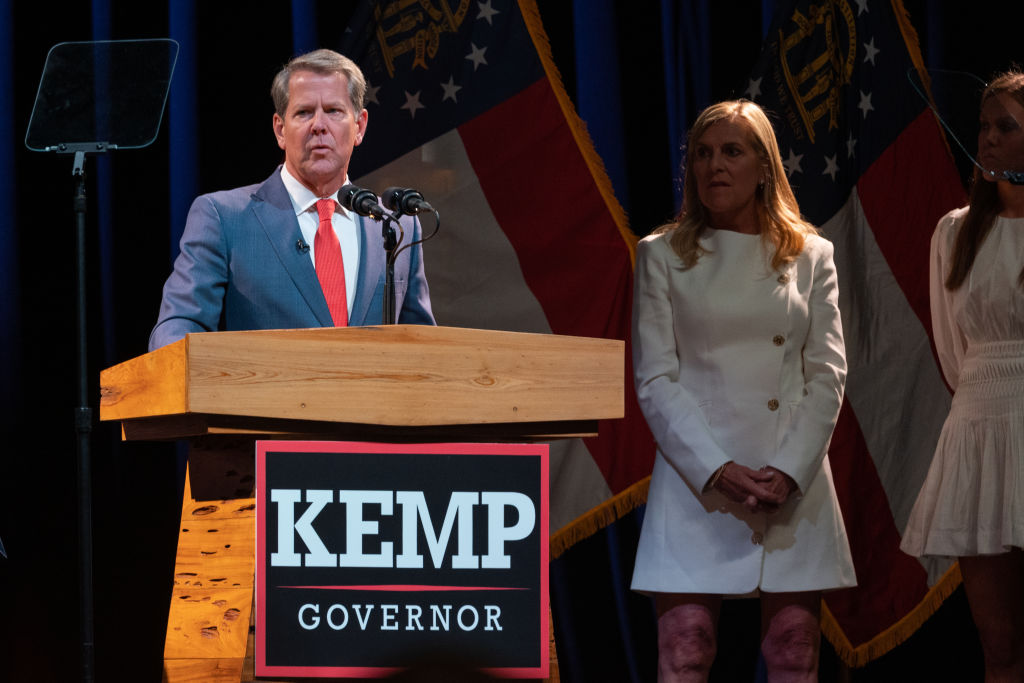The other governor
A Republican governor who took a libertarian approach to the pandemic has been the subject of considerable Democratic fear-mongering, finds himself in Donald Trump’s crosshairs and has seen his stock in his home state soar to unimaginable highs. I am referring, of course, to Georgia governor Brian Kemp.
Yes, for all that Florida’s Ron DeSantis has hogged the headlines as the big Republican winner of the last few years, his neighbor to the north has a similarly impressive story to tell. Like DeSantis, Kemp was sworn in for his second term as governor earlier this month. And, as with DeSantis, he went from a nail-biter in 2018 to a blowout win in 2022. Today, a new Atlanta Journal-Constitution poll published to coincide with his state of the state speech puts his approval rating at 62 percent; only two years ago, that figure languished at 42 percent.
Kemp’s address this morning offered a taste of his recipe for success, with a focus on the practical, specifically crime and public safety. He urged new restrictions on bail and tougher penalties for violent offenders. It was an echo of his victory last November, when he said that the election “proves that when Republicans stay focused on real-world solutions that put hardworking people first we can win now, but also in the future.”
Kemp and DeSantis have taken very different routes to their statewide popularity. In Florida, the Republican Party is surging, with DeSantis leading the charge and his colleagues clinging on to his coattails. Trump has recently started taking shots at “Ron DeSanctimonious,” but for a long time the governor and the then-president were in lockstep.
Kemp, by contrast, has had to deal with a fractious and far less successful GOP in Georgia. Republicans have lost three Senate races in the state in the last two years — with incumbents Kelly Loeffler and David Perdue face-planting in the 2020 run-off and Herschel Walker failing to topple Raphael Warnock last year. Meanwhile, Kemp’s relationship with Trump could hardly have been worse over the last few years. Ever since he held firm against the former president’s requests to help him block the results of the 2020 election, Kemp has been close to the top of his enemies list — making his easy victory two years later an especially awkward repudiation of Trump’s approach.
Kemp’s approach has been to mix low-key pragmatism with staunch conservatism: not taking the bait — whether it is being dangled by MAGAworld or the left — and focusing on results. The tension in this mix of ideological focus and a results-oriented ethos was on amusing display in a recent look by Politico’s Alexander Burns at the governor’s love of electric vehicles.
DeSantis’s appeal also starts with state-level competence, but the Floridian is a staccato and aggressive counter-puncher where Kemp’s style is more languid. Too languid, perhaps, for national success. As his Georgia drawl conveys, Kemp is unmistakably, aggressively southern — something Georgia Republicans suspect might limit his political future to statewide races. But whether or not his ambitions are limited to Georgia politics, Kemp remains a low-key but powerful repudiation of both those on the right who are desperate to write the obituaries of a certain type of old-school conservative Republican, and those on the left who think “effective Republican government” is a contradiction in terms.
*** Sign up to receive the DC Diary in your inbox here ***
Tank you very much
From Atlanta to Kyiv, where the Ukrainian government is jubilant at the news that Germany and the United States will supply tanks to the country. After much dithering, Germany’s Olaf Scholz has committed Leopard 2 tanks to Ukraine in a coordinated move that sees Washington sending thirty-one M1 Abrams tanks. The news will quiet, for now, talk of unease and division among Ukraine’s allies. Speaking at the White House today, Biden said that “these tanks are further evidence of our enduring, unflagging commitment to Ukraine and our confidence in the skill of Ukrainian forces.”
Writing for The Spectator, Mark Galeotti wonders whether these numbers are enough to make a difference, arguing that whether or not the German umming-and-aahing demonstrates a changing perception of the war, “it has certainly revealed the limited nature of the European powers’ arsenals.”
Gallego goes for it
Democratic congressman Ruben Gallego has come out swinging in his attempt to topple the newly independent senator from Arizona, Kyrsten Sinema. “I’m better for this job because I haven’t forgotten where I came from,” he told the AP. The swipe at Sinema echoes the message of his first campaign ad, underscoring his hardscrabble roots and the promise of the American dream. At present, Gallego’s path to the Democratic nomination looks reasonably clear, with Greg Stanton, another congressman who had considered running, declaring he will not do so. That sets up a messy general: a three-way fight between a Democrat, a Democrat in all but name and a Republican nominee to be picked by a state party that has undergone a dramatic transformation in recent years.
What you should be reading today
Bridget Phetasy: In defense of paranoia
Amber Athey: Why Biden’s document scandal is worse than Trump’s
Kevin Cook: Thirty years after Waco
Michael Gold and Nicholas Fandos, New York Times: Mystery deepens around George Santos’s $700,000 in campaign loans
Ruy Teixeira, Washington Post: Biden’s uphill battle with working-class voters
Jack Shafer, Politico: Sloppy Joe
Poll watch
President Biden job approval
Approve: 42.4 percent
Disapprove: 52.9 percent
Net approval: -10.5 (RCP average)
Are Biden’s classified documents a serious problem?
Very serious: 30 percent
Somewhat serious: 30 percent
Not too serious: 27 percent
Not at all serious: 6 percent (CNN)

























